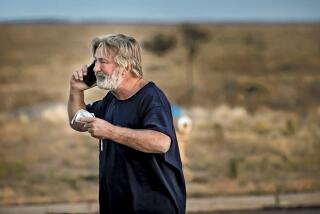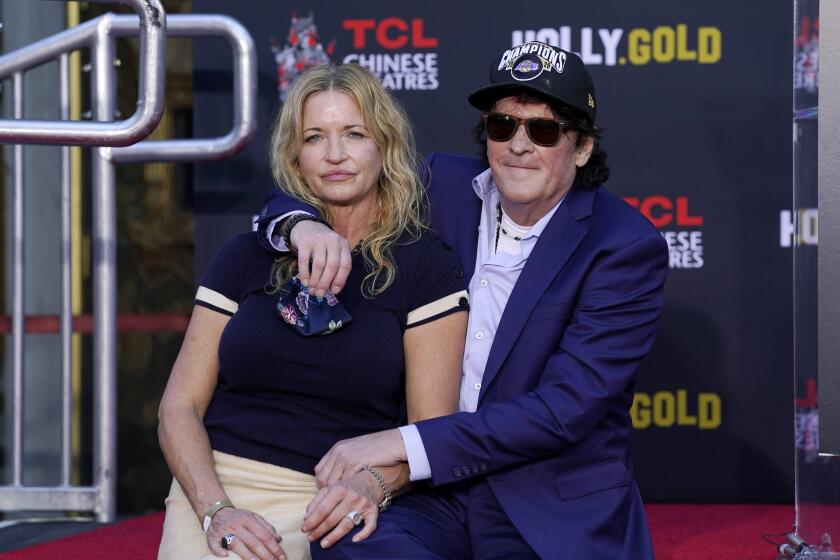‘American Sniper’ debate continues as trial in Chris Kyle death nears
Three weeks into its wide release, Clint Eastwood’s military drama “American Sniper” shows few signs of fading from the public imagination. The film about the late Navy SEAL Chris Kyle has emerged as a blockbuster hit, garnered six Oscar nominations and dominated the cultural conversation.
With the real-life trial approaching for Kyle’s accused killer, fellow Iraq war veteran Eddie Ray Routh, debate continues about whether Eastwood’s film is a clear-eyed look at the horrors of war or an oversimplified propaganda piece — or both, or neither, or something in between.
In recent days, assorted celebrities, commentators and politicians have weighed in. Here’s a look at what some notable voices have had to say.
Bradley Cooper, who portrays Kyle in the film, recently told NPR he didn’t expect “Sniper” to become such a political hot button. He and Eastwood were hoping to draw attention to the plight of veterans, he said.
“The fact that it’s inciting a discussion that has nothing to do with vets — and it’s more about the Iraq War and what we did not do to indict those who decide to go to the war — every conversation in those terms is moving farther and farther away from what our soldiers go through, and the fact that 22 vets commit suicide each day,” Cooper said. “The amount of people that come home is so much greater because of medical advancement and … we need to take care of them.”
According to the filmmaker himself, “American Sniper” is an antiwar movie. Over the weekend at the Producers Guild Award Nominees Breakfast, Eastwood said, “The biggest antiwar statement any film” can make is to show “the fact of what [war] does to the family and the people who have to go back into civilian life like Chris Kyle did.”
Elsewhere, Michael Moore re-entered the conversation after first becoming a lightning rod when he criticized snipers on Twitter during Martin Luther King weekend. (As Moore himself has noted, his initial tweets did not explicitly mention “American Sniper.”)
In an in-depth interview with Vice, Moore said the film shows some of the dire consequences of war. “Every main character in the film either ends up messed up by the war, turns against the war and becomes antiwar, or dies,” Moore said. “There’s not some American victory to cheer at the end, and there’s no instance of ‘Go look what we did.’ … There is none of that in this film. There is no catharsis.”
But Moore also complained that the film oversimplifies how and why the U.S. went to war. He said, “This is where the film gets a little messy for me, because Clint basically just wants to make an old-style western — you know, keep things really simple and don’t complicate matters. … It was like a B-movie in that way. And then of course there’s all the historical things that are wrong, but we don’t really want to get into that. It’s a movie; I’m not watching it as a documentary.”
Days earlier, Kyle’s brother, Jeff Kyle, appeared on the Fox News show “Hannity” and credited “American Sniper” with “getting the message out there that Chris wanted.”
Jeff Kyle said the film is “not a war story. You know, it’s not a shoot-’em-up, blow-’em-up movie. It’s a story about a soldier in combat. Whether it’s on the battlefield or off it, he’s still in combat, you know? So it tells that story and it shows what every soldier that has been in that situation — what we have to go through in country and back home.”
Even the first lady, Michelle Obama, has weighed in on the film. During a launch event for a new program promoting the realistic representation of veterans in the entertainment industry, she said, “While I know there have been critics, I felt that, more often than not, this film touches on many of the emotions and experiences that I’ve heard firsthand from military families over these past few years.”
Follow @ogettell for movie news
More to Read
Only good movies
Get the Indie Focus newsletter, Mark Olsen's weekly guide to the world of cinema.
You may occasionally receive promotional content from the Los Angeles Times.









